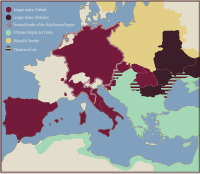
Back Свещена лига на папа Климент VIII Bulgarian Liga Santa (1594) Spanish Liga Sfântă (1594) Romanian Священная лига (1594) Russian Света лига папе Климента VIII Serbian Священна ліга (1594) Ukrainian
| Holy League | |
|---|---|
 The Holy League (purple; Orthodox members in darker shade) and theaters of war in 1595 | |
| Founder | Pope Clement VIII |
| Leaders | |
| Motives | Expulsion of the Ottoman Empire from Europe |
| Ideology | Christianity |
| Allies | |
| Opponents | Ottoman Empire |
| Battles and wars | |
The Holy League established in 1594 by Pope Clement VIII was a military alliance of predominantly Christian European countries (Holy League) aimed against the Ottoman Empire during the Long War (1591–1606). The aim of this alliance was to drive the Ottoman Empire out of Europe[1]
The coalition was led by Rudolf II, Holy Roman Emperor.[2] The Holy See took for granted that Poland would join the League, together with all most powerful neighbours of the Ottoman Empire, in spite of their mutual enmities.[3] The league expected an assistance of the Balkan's Christian population.[4][5]
The establishing of this Holy League was only partially successful,[6] while Holy League managed to halt further Ottoman conquests in Europe.[7]
- ^ Oțetea, Andrei; MacKenzie, Andrew (August 1985). A Concise history of Romania. R. Hale. p. 216. ISBN 978-0-7090-1865-0.
These conditions were met in the late sixteenth century when the Holy League (the Habsburgs, the papacy, Spain, and some German and Italian principalities) formed a new alliance whose aim was driving the Ottomans from Europe.
- ^ Hentea, Călin (2007). Brief Romanian Military History. Scarecrow Press. p. 62. ISBN 978-0-8108-5820-6.
The pan-Romanian front started to take shape in the winter of 1594–1595 when the Romanian rulers were practically fighting against the Ottoman Empire within the Holy League, the major anti-Ottoman coalition led by the Habsburg emperor Rudolph II.
- ^ The Polish Review. Polish Institute of Arts and Sciences in America. 1958. p. 14.
In addition to the Transylvanians, Moldavians and Wallachians, the Cozaks were expected to help, and he emphasized that the Muscovites too should be invited to do so by the Holy See, taking it for granted that the Poles under their famous leader Zamoyski would certainly join. The idea that the three strongest land powers in the neighborhood of the Ottoman Empire should cooperate in such a league, in spite of the tensions between them, was not new indeed.
- ^ Oțetea, Andrei; MacKenzie, Andrew (August 1985). A Concise history of Romania. R. Hale. p. 216. ISBN 978-0-7090-1865-0.
the participants in the League counted on the assistance of the Balkan peoples who had been constantly on the move during the last ...
- ^ MacKenzie, Andrew (1990). A journey into the past of Transylvania. Hale. p. 76. ISBN 978-0-7090-4125-2.
... the participants in the League counted upon the assistance of the Balkan peoples. This was necessary because the ...
- ^ Hsia, R. Po-chia (15 April 2008). A Companion to the Reformation World. John Wiley & Sons. p. 211. ISBN 978-1-4051-7865-5.
Pope Clement VIII achieved partial success in establishing the Christian coalition during the Fifteen year war...
- ^ Bues, Almut (2005). Zone Di Frattura in Epoca Moderna: Il Baltico, i Balcani E L'Italia Settentrionale. Otto Harrassowitz Verlag. p. 241. ISBN 978-3-447-05119-4.
Pope Clement VIII achieved a partial success in establishing the Christian coalition during the Fifteen Year War, halting further Turkish conquest